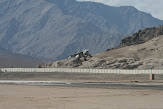The happenings of the last few weeks have posed some serious questions to the overall agitation for the separate state of Gorkhaland. The frequency with which many executive members from the principal “Pro-Gorkhaland” party, the Gorkha Jan Mukti Morcha (Gorkha People’s Liberation Front) switched back and forth, pillar to pillar between various leaders of the leading national parties including BJP and Congress, have yet again proved that the question of Gorkhaland is far from being answered by any of the major stake holders of the nation. Even if some party may give moral support to the demand, the likelihood of all out support by way of including it in the election manifesto of the parties remains bleak. This has not only to do with the principal opponents of the formation of Gorkhaland, the political elite of the state of West Bengal, but also to the general mindset of the people of rest of India, who resent any more division of the state especially on ethnic lines.
Through out the modern history of the Indian Sub-continent, the ethnic- Nepali people of Darjeeling have always been side-lined in the corridors of power by the ruling elite of West Bengal. This is evident from the fact that although Darjeeling was a “Partially-excluded district” until 1954, and enjoyed some independent status vis-à-vis West Bengal till the said time, it was subsequently absorbed into the state of West Bengal under the Absorb Area Act, when all evidence proved that Darjeeling and the adjoing areas of Dooars along with its people shared a commonality to other various ethnic groups in the North-East which were then mostly made part of the state of Assam. Further, while most other regions of the North East which were absorbed into Assam were given a distinct Status according to the provisions of the Sixth-Schedule of the Constitution of India, the said provision was over-ruled in Darjeeling although it enjoyed the same status as a “Partially Excluded District” under the Govt of India act 1936 as other Partially Excluded Districts such as the then, Lushai Hills and Naga Hills. Such was the power and influence of the Ruling elite of West Bengal that, even though a powerful pitch was made by the people of Darjeeling infront of the State Re-rogansiation committee of the time to accept the demand for a separate administrative unit on linguistic lines, the proposal was rejected and the Govt of India even failed to recognize the Nepali language as a scheduled language of India as per the Eight- schedule of the constitution. The same power and influence is today being noticed where the major political powers of India are refusing to even speak in favor of the Gorkhaland lest they antagonize their electorates in one of the most powerful states of India.
To analyze this we need to see that West Bengal alone sends a total 42 Member of Parliaments to the Lower House of the Parliament. This is little below 10% of the overall strength of the House. It is obvious that every party worth its salt wants to have a share of this huge pie, in order to claim its strength in the corridors of power, and no matter what the final outcome, no one wants to antagonize the electorates by working against the majority of the people in the state. This is true more so when State assembly elections and National General elections happen simultaneously with a gap of nearly 2-3 years. Any decision taken after the General Elections quickly reflects into the State Assembly elections two years later and vice-versa. Thus with the kind of power equation and the emotional perception of the people against another “Partition of Bengal”, it would be foolish for any political party to support or even contemplate supporting the Gorkhaland Demand whose voters have impact on only a Half of the Lok Sabha seat of Darjeeling. Thus with the political possibility out of the equation, what else could result in the formation of another state? The answer is indeed a mystery, as the political expediency with which our successive Governments have resolved urgent national issues is something to loathe about. And nothing, not event questions of national security have been implemented without something as big as Kargil or 26/11 happening. Expecting such a “People’s government”, suddenly sitting up and solving the issue of a separate state for a significant minority of an ethnic group, is indeed wishful thinking.
Moreover the general opinion of the masses of intellectual India, who live in Air-conditioned homes in the newly developing metropolises such as Mumbai, Bangalore and Delhi which enjoy near world class facilities have no clue to what people face when they live in a neglected, insignificant part of a state whose economy is in shambles as a result of years and years of militant Communist ideology. For them the real problem faced by India is the new Prahmod Muthaliks and MNS followers who use cultural and regional nationalism to further their propaganda of hate for Western and non-conformal ideas. They view regionalism and a question for one’s rights and space as another growing example of the likes of regionalist destroying the integrity and peace of the nation. As a result of this, they look at people demanding their right with contempt. They look at every demand for one’s right, be it demand for a separate state or a demand for reservation for them within a narrow prism of suspicion, not realizing the fact that beyond the luxuries of city life there are various regions in India which suffer from neglect, discrimination and abject poverty.
The option of leading a more militant and violent agitation for the fruitful realization of the demand is futile, as this would lead to even more degradation of the social fabric of the region. It would lead to Human Rights abuses, excesses and something far more sinister than any thing imaginable. Moreover, the presence of heavy security forces along various key border regions of the area makes it even more improbable that anything violent can be planned or executed in the region. Hence, forcing the government to concede to the demand by positioning oneself in a strong position is again ruled out. The result was amply clear when during one of the violent times in the recent pro Gorkhaland agitation, the center refused to actively intervene or even speak on the situation. The resultant Tri-partite meetings were convened after the incumbent Chief Minister of West Bengal pushed the center to hold the meeting. The successive powers of Delhi have refused to take the agitation seriously and have refused to play any significant part, lest it opens a pandora’s box, with similar movement being launched across the nation. We have to remember that as we speak there are more than a dozen such groups demanding a separate state within India , highlighting various, ethnic, regional, and economic grievances. Heeding to one such demand by a numerically insignificant group would make the voices of other such demands more stronger and as a result this will add to the woes of the Government in the Center.
Monday, March 16, 2009
Why I feel that Gorkhaland is not possible in the near future. – Part 1
Posted by Anant Dhamala at 5:27 AM
Subscribe to:
Post Comments (Atom)










1 Comment:
I agree to your logic and your logistics, both. Creation of a "Gorkhaland" does look bleak, at least in the near future. Unless we have, like you always say, a voice in the Parliament who can justify and bring forth the plight and the justification of the cause of Gorkhaland.
It's very heart warming to know that you are fervently following the cause and posting such mind opening facts. Keep at it - general awareness is the key for Gorkhaland, and this is a small but significant step in that direction.
Kudos to you bro!
Post a Comment